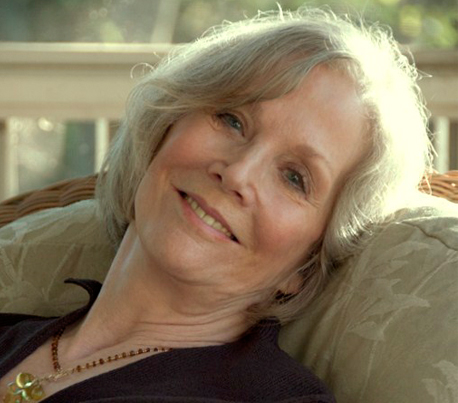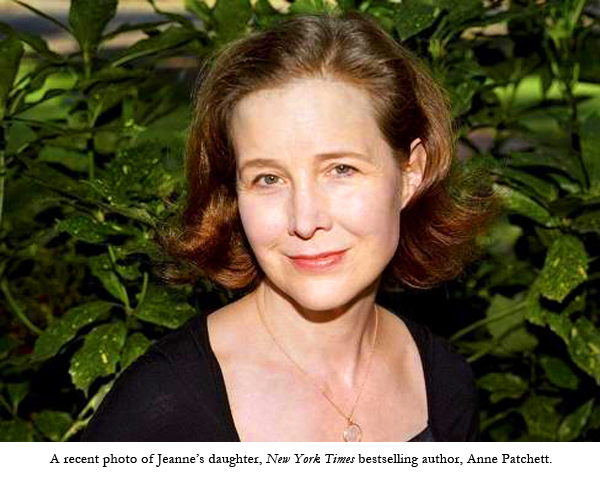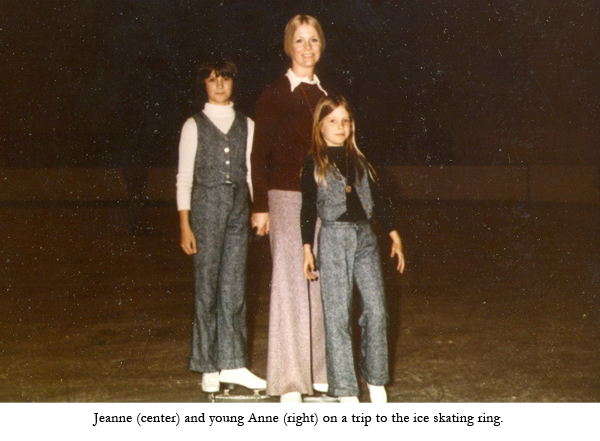
Location: Nashville,TN
Age: 75
Marital Status: Married
Education: St. Vincent’s College of Nursing, Los Angeles, CA
“Like mother, like daughter,” is how the saying goes. But, for FOF Jeanne Ray, such was not the case.
Jeanne spent most of her career as a nurse, working for one of the most well-known doctors in Nashville. “It was a very, very interesting and gratifying job,” she says. Her daughter, Ann Patchett, knew she wanted to be a writer from “when she came out of the uterus,” says Jeanne. “My husband and I tried to convince her to pursue a more practical career, like dental hygienist.” But, Ann followed her calling, becoming an award-winning author and eventually taking home the prestigious Pen/Faulkner Award and the Orange Prize for her 2001 novel, Bel Canto.
Jeanne, herself, had always loved writing, but pursued it purely as a hobby. “When Ann was younger, we’d make up poems,” says Jeanne. “I even wrote short stories every now and then for my own entertainment.” When Jeanne turned 60, she experienced what she describes as “a poking from within,” an idea that she couldn’t shake. In the evenings when she got home from her nursing job, she began to form this idea into a book. “I showed it to Ann when I was about half done,” says Jeanne. “She really liked it. She kept saying ‘look, you’re going to do this, but you can’t just fiddle around. Writing is work.” And, work it was! Jeanne found herself waking up at 3 a.m. some mornings to write for a few hours, then would go back to sleep just to wake up at 6 a.m. for work. When the book, was complete, Ann gave her mother, Jeanne what she describes as “the biggest gift,” and sent the manuscript to her agent. The novel, Julie and Romeo about star-crossed FOF lovers, was purchased by publishing-giant, Random House and quickly climbed to the top of the New York Times bestseller list. Since then, Jeanne has had six subsequent “pokings” compelling her to write 5 more chart-toppers plus her soon-to-be released novel, Calling Invisible Women.
“People are always coming up to me and saying, ‘congrats, you really raised such a wonderful daughter,’” says Jeanne. “I say, ‘thank you, but actually Ann raised me a in a lot of ways.’”
How close are you and your daughter, Ann?
On a scale of one to ten, I’d say ten. We’re really best friends. We live just two blocks apart in Nashville. When I walk my dog, I pass her house.
Were you raised in Nashville?
No, I was born in San Diego and went to school in the Los Angeles area. Then, I moved to Nashville and have lived here ever since.
You and your daughter are both best-selling novelists. Who inspired whom?
Frankly, Ann has always been the writer. When she was as young as 8, she told her father and I ‘I want to dedicate my whole life to writing.’ She had a traditional writer’s education at Sarah Lawrence College and then went to the University of Iowa Writers’ Workshop. But, Ann always thought of me as a writer. Once in second grade, the teacher asked her students about their favorite writer. Ann said, ‘my mother,’ which was very flattering but kind of crazy.

She had such foresight!
Well, in the eyes of a seven-year-old, she thought I was good. But, Ann got more and more well-known. She sold a couple of short stories when she was just 19 or 20 and wrote her first novel in her early 20s. It was obvious that she had it. Ann was the writer and I was the nurse, although Ann always believed I was a writer.
Why did you retire from nursing?
I thoroughly enjoyed nursing and didn’t want to give it up but I had that poking inside of me to write a book. The doctor I worked for was delightful and had wonderful patients like the mayor and governor. It was a very gratifying job. When my first book was successful and they wanted me to write a second, I realized I couldn’t go on forever writing all night, nursing all day. So I went part-time. That became quite stressful and eventually, something had to go. It had to be nursing. I was approaching 65 anyway and I didn’t think I was as sharp. I figured I’d be much better creating something.
What’s your advice for someone who wants to start writing in their 50s or 60s?
Read prolifically. You have to come to the point in your reading where you’re discriminating about what moves you, what delights you and what makes you sad—that’s the most important thing to me as a writer.
Most of your books speak to an audience of a certain age, such as your latest book Calling Invisible Women. Did you set out with this as a mission?
When I turned 60 it was before the baby boomer rush had hit. It was before, people were really understanding that being 60 is not really a bad thing. I thought there was no voice out there that was speaking to older people.
Tell me about Calling Invisible Women.
The metaphor in this book is that when you get past menopause you become invisible. Instead of making it a negative, I thought why not turn it into a gift? I think Clover, the main character, didn’t recognize it as a gift at first. In fact, I think she was hurt badly because her family didn’t realize she was gone. As time goes on she realizes there are advantages to being invisible—she meets with a group of other women and they learn to harness the power from their invisibility.
What was an inspiration for this story?
I’ve always been fascinated by superheroes and how they use their superpowers for good not evil.
Does the book stem from any of your own experiences?
I think so, especially in regards to raising teenagers and having a very busy husband.

What do you want readers to take away from your story?
I think a lot of women reach a certain age and don’t have quite as much energy as they used to—their light dims. I think we can brighten that light and make ourselves visible by doing productive, healthy, compassionate things‐loving people more, taking a bowl of stew over to your sick neighbor. I hope readers get that.
What other tips you would give to women over 50 to not feel invisible?
Read, keep up with what’s going on in the world and stay active.
What do you do to rejuvenate?
Pilates. It makes me feel better about my body. It changed my life. Also putting on makeup is the first thing I do in the morning after I take a shower. If I don’t, I tend to be kind of shadow-y.
What are your favorite books?
I love State of Wonder by my daughter. Let’s face it, I love all my daughter’s books. Dickens is my favorite writer—I love his vocabulary and his mind. If there’s someone I could meet it would be him.
What’s in store for the future?
I’m not certain I’ll write another book, but I always say that, then these little ideas poke me…
Images courtesy of Jeanne Ray, Ann Patchett


0 Responses to “Meet Jeanne Ray”
beechnut79 says:
I am also one who began writing books fairly late in life. So far I have three self-published books and the manuscripts for five more. I began a ninth but never finished it. Since you live in or around Music City you might appreciate the fact that I let my book writing go to concentrate on the writing of song lyrics. From those I have had 17 so far demoed to music. Much, much is on hold due to the fact that it costs an awful lot of money to get anything done; money I just don’t have.